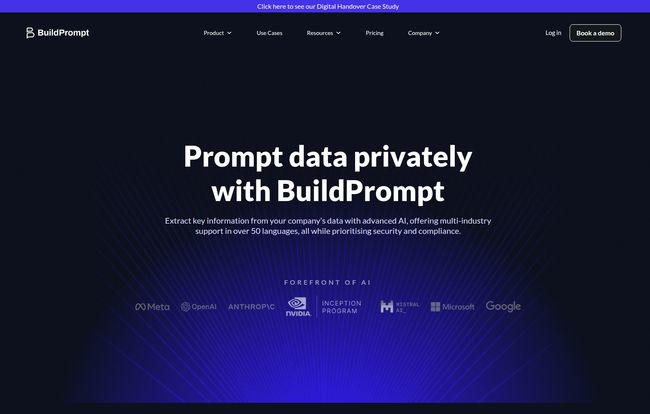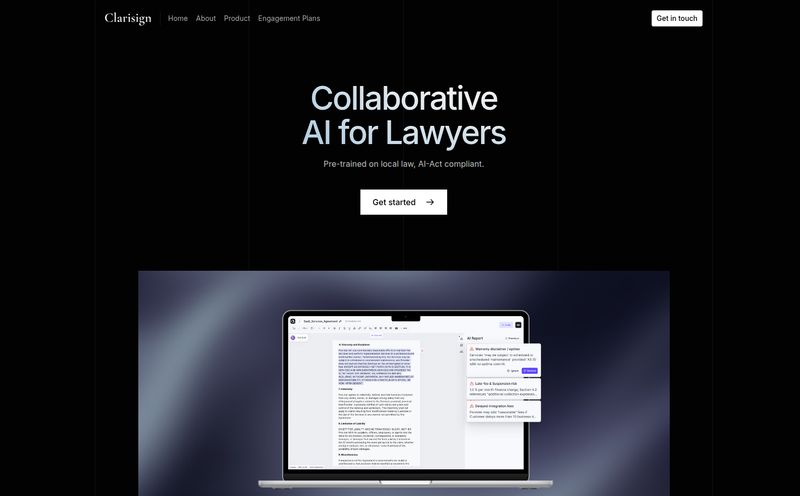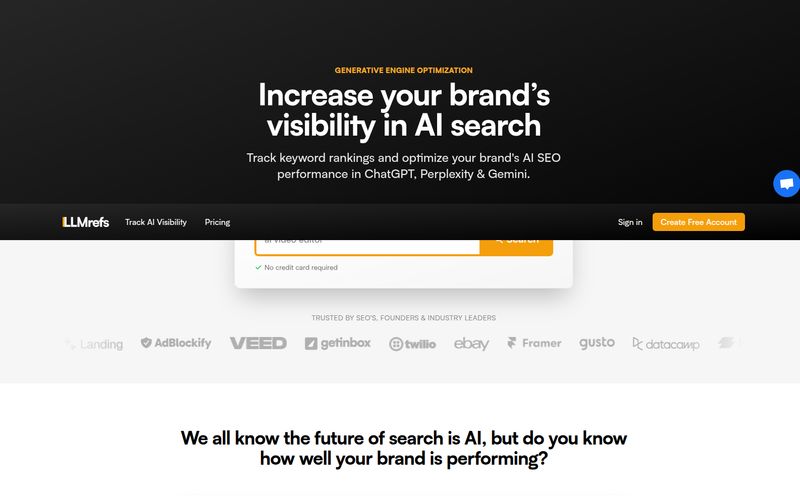If I have to sift through one more 300-page PDF or a labyrinth of shared folders to find a single statistic, I might just lose it. We've all been there. The information is somewhere in the company's digital attic, but finding it feels like a full-blown archaeological dig. We're drowning in data, but thirsty for actual answers.
For years, the solution has been better search functions, more organized folders, more tags... more work. But what if the answer wasn't better organization, but better intelligence? What if you could just... ask your documents a question? In plain English?
That’s the promise of a new wave of tools, and one that recently caught my eye is BuildPrompt. It calls itself an AI File Explorer, and frankly, I love that description. It's not just another search bar; it's a tool designed to have a conversation with your data. So, I decided to take a closer look.

Visit BuildPrompt
So, What Exactly is BuildPrompt?
Imagine hiring a brilliant, incredibly fast research assistant who has already read every single document, spreadsheet, and database in your entire company. That's the simplest way I can put it. BuildPrompt connects to your existing data environments—all those messy folders and databases—and uses some serious AI (powered by the big names like OpenAI, Anthropic, and Google) to understand the content.
The core idea is simple: you ask a question, and it gives you a precise answer, citing the source document. No more keyword guessing. You can ask things like, “What was our Q3 revenue from the European market last year, and which document is that in?” and it's designed to spit back the answer. It’s a pretty compelling proposition for anyone who’s ever spent an afternoon hunting for a single data point.
The Features That Actually Matter
Any new platform can throw a bunch of fancy-sounding features on a landing page. But which ones actually move the needle? After looking through BuildPrompt’s offerings, a few things really stood out to me as genuinely useful.
Talking to Your Data in Plain English
This is the main event. The platform’s Intelligent Prompting and Database Querying are the heart of what it does. Instead of writing complex SQL queries or trying to remember the exact filename of a report from 2021, you just ask. This lowers the barrier to entry for data analysis dramatically. Your marketing team, your legal department, your project managers—they can all get their own insights without needing to bug a data analyst. This democratizes data access, which is something we’ve been talking about in the industry for years, but few tools have actually nailed it.
Beyond Just Words: It Has Eyes
Okay, this is cool. BuildPrompt boasts Multimodal Vision Capabilities. In non-jargon terms, this means it can analyze images, charts, and other visual data. This is a game-changer. So much critical information is locked away in visuals—graphs in a presentation, site photos in a construction report, or diagrams in a technical manual. Being able to ask, “Show me all the site photos from the 'Project Phoenix' folder that show water damage” is a level of analysis that was pretty much science fiction for most companies until recently. It's like giving your data archive a pair of eyes.
Putting Repetitive Work on Autopilot
We all have those mind-numbing, repetitive data tasks. Maybe it's pulling the same weekly metrics or summarizing monthly client reports. BuildPrompt's Automated Workflows feature is designed to tackle this head-on. You can set up workflows to automate the tedious parts of data extraction and reporting. This isn’t just about saving time; it's about freeing up brainpower for more strategic work. Less time compiling, more time analyzing. I’ve always said that the best tech is the kind that makes itself invisible by handling the grunt work, and this seems to fit that bill.
A Big Deal for Businesses: Security First
Let's talk about the elephant in the room with any AI tool: data security. The idea of feeding all your sensitive company documents to an AI can be... unsettling. BuildPrompt seems very aware of this. Their whole angle is “Prompt data privately.” For their Enterprise clients, they offer a hosted LLM for maximum security and even the ability to deploy on-premise. This means your data doesn't have to leave your own secure environment. For any business in sectors like legal, finance, or healthcare, this isn't just a feature; it's a requirement.
Who is This Tool Really For?
While a tool like this could be used by almost any knowledge worker, BuildPrompt seems to be focusing on data-heavy industries. Their website specifically calls out Infrastructure, Construction, and Legal. And it makes perfect sense. These fields are notorious for having mountains of complex documents—contracts, blueprints, case law, compliance reports. The ability to instantly query a 500-page contract for a specific clause or analyze thousands of daily site reports is immensely powerful. It’s built for teams that need to collaborate on a shared pool of knowledge and get to the right answer, fast.
Let's Talk Money: BuildPrompt Pricing
Alright, the all-important question: what's this going to cost? BuildPrompt has two main tiers.
There's a Free plan, which is great for kicking the tires. It’s for all new users and gives you access to their open-library of sources, some expert-written industry insights, and 10 free library prompts. It’s a good way to get a feel for the interface without any commitment.
Then there's the Enterprise plan. As is common with B2B SaaS tools like this, the pricing is on request. You have to book a demo and talk to their sales team. While I always wish companies were more transparent with pricing, it's understandable. Enterprise needs are rarely one-size-fits-all. This plan unlocks everything: uploading your own PDFs and docs, team management, custom workflows, the high-security hosted LLM, custom model deployment, and all the powerful features we talked about. You're not just buying a tool at this point; you're investing in a solution tailored to your company's infrastructure.
My Honest Take: The Good and The Could-Be-Better
No tool is perfect, right? From my analysis, BuildPrompt has some serious strengths. The ability to get quick, precise answers from huge datasets is its biggest win. The real-time collaboration, strong security options, and workflow automation are also huge pluses. The multimodal stuff is just plain impressive.
On the flip side, the lack of public pricing for the main offering will be a turn-off for some. You have to be serious enough to book a demo to find out the cost. Also, like any powerful tool, there's likely a learning curve. Setting up automated workflows and connecting data sources isn't always a simple plug-and-play operation, it might require some technical know-how to get started. It’s not a magic wand, it’s a powerful instrument that you have to learn to play.
FAQs About BuildPrompt
What is BuildPrompt in simple terms?
Think of it as a private, super-smart search engine for your company's files and data. You can ask it questions in normal language, and it finds the answers from within your documents, even analyzing images and charts.
Is BuildPrompt secure for sensitive business data?
Security seems to be a core focus. The Enterprise plan offers options for a privately hosted LLM and even on-premise deployment, meaning your data can stay within your own secure network, which is a critical feature for many organizations.
What kind of files and data can it analyze?
It supports a wide range, including text documents like PDFs and DOCX files, structured data from databases, and even visual data like images and graphs thanks to its multimodal capabilities.
Can I use BuildPrompt for free?
Yes, there is a free plan available for all new users. It provides access to a public library of documents and a limited number of prompts so you can test out the platform's functionality.
What makes BuildPrompt different from a regular search bar?
A regular search bar finds keywords. BuildPrompt understands context and intent. It doesn't just show you a list of documents that contain your words; it synthesizes information to give you a direct answer, much like a human research assistant would.
Do I need to be a data scientist to use it?
No, and that's the point. It's designed to be used by anyone in a team by allowing queries in natural language. While setting up complex workflows might require some configuration, the day-to-day use is meant for non-technical users.
The Final Word
The sheer volume of data isn't our problem anymore; it's making sense of it. Tools like BuildPrompt are stepping in to bridge that gap. It's an ambitious platform that's tackling a very real, very frustrating problem for modern businesses. The focus on security, natural language, and automation makes it a compelling option, especially for the industries it targets.
Is it the right tool for everyone? Maybe not. But for any company feeling the pain of buried information, it’s absolutely worth exploring. The free plan is a no-brainer to try. In a world of endless data, a tool that provides clear answers is more than just helpful—it’s a competitive advantage.
References and Sources
- BuildPrompt Official Website: https://www.buildprompt.com/
- BuildPrompt Pricing Page: https://www.buildprompt.com/pricing



